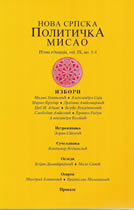Izborne reforme - slučaj Srbija
Electoral Reforms – the Case of Serbia
Author(s): Milan N. JovanovićSubject(s): Politics / Political Sciences
Published by: Nova srpska politička misao
Keywords: electoral system; political consequences of electoral legislation; electoral reform; registering of voters; threshold;
Summary/Abstract: In one decade Serbia applied almost all of the most widely spread types of electoral systems. Only two electoral cycles for the central representative body were held on the same electoral model. The consequences of electoral legislation on the party system, on the functioning of the parliament and government, were not in line with the parties' expectations, while conflicts between parties in the past decade centred around the electoral system reform. Not one electoral system managed to achieve more than two of the functions that it is expected to: simplicity, participation, aggregation and effectiveness, representation and legitimacy. All electoral reforms were under the strong influence of party self-interests. The attention is now focused on the need for a thorough reform of all elements of electoral legislation, and, along with that, only on the registering of voters, the threshold and on testing the public to establish whether it would accept some of the different kinds of combined majority-proportional model. The author presents his proposals on how to make voter rolls, points to the problems that lowering the threshold could have on the fragmentation of the party system and presents his proposals on how to minimize the potential of the small parties for blackmail; he warns of the potential consequences of introducing a trench electoral model.
Journal: Nova srpska politička misao
- Issue Year: 9/2002
- Issue No: 01+04
- Page Range: 67-87
- Page Count: 20
- Language: Serbian
- Content File-PDF

